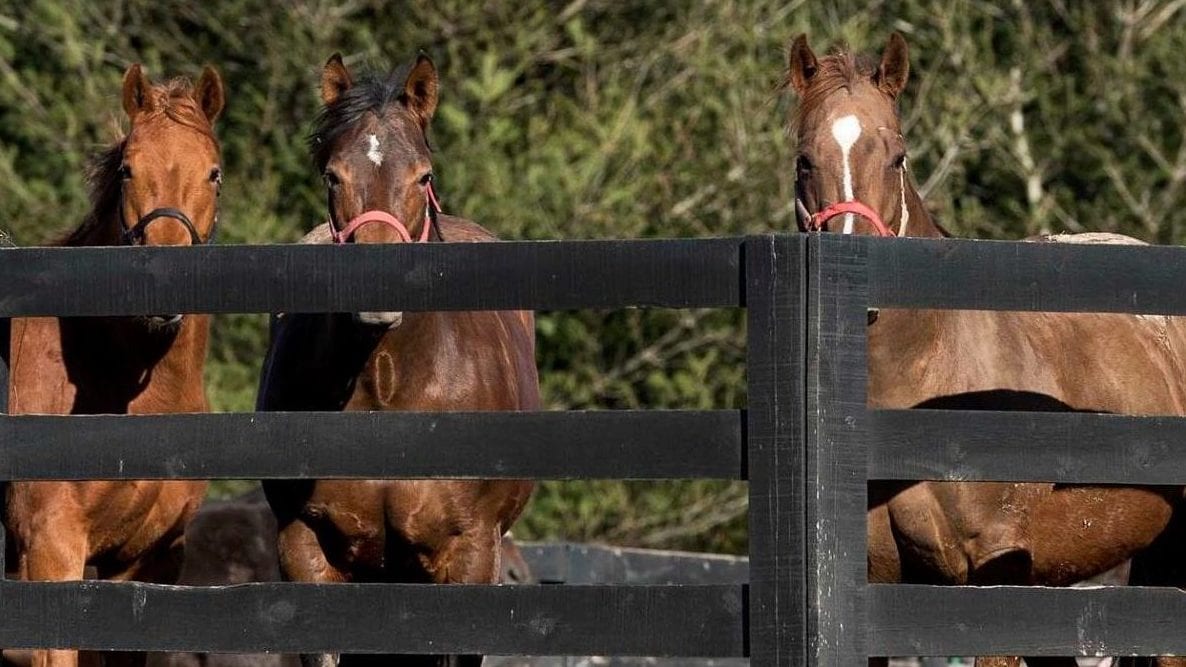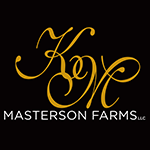Whether you are horse crazy or just mildly obsessed, you value horses, and that tends to impact several aspects of your life, including your career goals. Some obvious horse career paths that come to mind are professions such as veterinarian or horse trainer.
Other horse careers may combine various interests and you could start your own small business that could focus on fashion, equine nutrition, photography, or graphic design. Those are all great career options, but what if you don’t want to start your own business?
At first glance of the job market, you might feel like your equine career options are limited, but the horse industry requires a variety of skills and you might be surprised by the number of options available.
Here are five not so obvious, underrated jobs in the equine industry.
Breed Associations
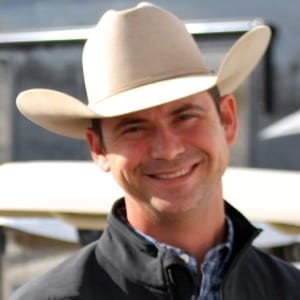 Positive member experience is one of the top goals for every breed association, but it can be challenging to meet everyone’s expectations unless you have qualified and passionate people in charge. David Dellin is the Senior Director of Judges, Shows, and Education for the American Paint Horse Association.
Positive member experience is one of the top goals for every breed association, but it can be challenging to meet everyone’s expectations unless you have qualified and passionate people in charge. David Dellin is the Senior Director of Judges, Shows, and Education for the American Paint Horse Association.
When asked about the day-to-day tasks associated with his job, he explained, “Jobs like mine involve everything from answering questions for the public, developing educational processes for judges and exhibitors, working with committees to grow the association, editing videos for testing and education, and strategically planning for the future.”
As for the requirements to be successful, Dellin suggested that “People and computer skills are both essential. You need to be well versed in horses, but you also need to be able to talk to people. Computers run everything in modern society, so the more computer skills you have before starting for an association, the easier it will be to do any of the jobs we have.”
David Dellin expressed that the hustle and bustle of working for a breed association is worthwhile because “the people and horses are what I love most about working for APHA. We have a great staff, Executive Committee, and Directors that all work very hard to promote, preserve, and provide meaningful experiences with Paint horses.”
So, if you’re computer savvy and enjoy working with people, perhaps you could apply and provide your unique perspective to the task at hand.
Breeding Farms
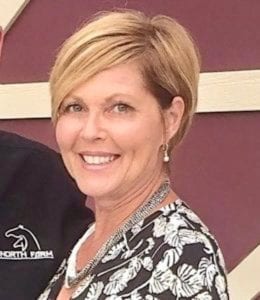 If you have a passion for little ones and are knowledgeable about horse care because you never want to leave the barn, then perhaps you’re suited to become involved with a breeding farm.
If you have a passion for little ones and are knowledgeable about horse care because you never want to leave the barn, then perhaps you’re suited to become involved with a breeding farm.
Debbi Trubee oversees North Farm in North Lawrence, Ohio which stands leading sires Winnies Willy, The Best Martini, Makin Me Willy Wild, and I Am The Party.
Debbi knows firsthand how demanding the job can be. She states, “When you are managing a large herd of horses, the day never really ends. The first task, starting at sunrise, is to put an eye on every horse on the place to make sure none of them had any issues during the night. There is always a long list of to-dos each day, whether it is bringing mares in for vet checks or giving shots, worming, or gathering horses for the blacksmith on any given day.”
Trubee shared that if anyone is considering being a part of the breeding industry, they must understand, “this is not a 9-5 job. If someone doesn’t have a true love for animals, this is not the line of work they should be considering. The horses are completely dependent on us for all of their care, so understanding that the horse’s needs come before our own is paramount.”
When asked what the most challenging aspect of her job was, Trubee answered, “Knowing that there is life and death in dealing with animals. Understanding that, despite our best efforts, we can’t save every horse and losing any of them is always heartbreaking for me.”
Trubee also shared that her favorite part of her career is “watching the babies grow and thrive then move on to show homes and becoming successful!” Being present for a horse’s very first moments and then watching them succeed in the show pen is undoubtedly rewarding and can make all efforts worthwhile.
Nutrition
 Equine nutritional companies understand the appeal of hiring employees with equine backgrounds because these employees can formulate specific feeding regimes for their customers based on the horse’s needs.
Equine nutritional companies understand the appeal of hiring employees with equine backgrounds because these employees can formulate specific feeding regimes for their customers based on the horse’s needs.
Sarah Ranker acts as an Equine Marketing Specialist for Tribute Equine Nutrition, where she makes an impact on horses and the quality of their feed program. Sarah shared, “A big part of my day is to be the first point of contact when it comes to customer inquiries, whether it be via email, phone, Facebook, or live chat. I work directly with our equine nutritionist to provide the best feeding recommendation for our end consumers. I also assist in managing both the advertising for Tribute Equine Nutrition.”
When asked if having an equine background had benefitted her, Sarah stated, “Absolutely, I have ridden horses my entire life and then went on to study at The University of Findlay. My equine background has given me a solid foundation for my role today.”
By comprehending the day-to-day struggles of owning a horse, employees with equine backgrounds care about the animals consuming the actual product. There are many roles between marketing, sales, and customer service, but each one benefitted when a knowledgeable individual with a passion for equine welfare was hired. Lastly, Sarah explained that she loves her job because “I am in such a learning environment. Every day, I learn something new and more complex about equine nutrition.”
Sales
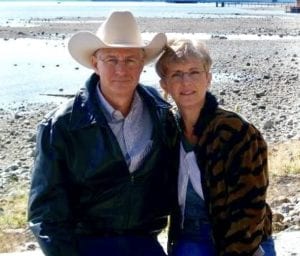 If you are eager to present and focus on a more specific product, perhaps, you’re more inclined to sales. Mike and Stephanie Jennings formed Professional Horse Services, LLC to focus on providing Professional marketing and other services to the Quarter Horse and performance horse industry. They run a two-person operation where Mike conducts most of the marketing as auction manager while Stephanie runs the administrative processes.
If you are eager to present and focus on a more specific product, perhaps, you’re more inclined to sales. Mike and Stephanie Jennings formed Professional Horse Services, LLC to focus on providing Professional marketing and other services to the Quarter Horse and performance horse industry. They run a two-person operation where Mike conducts most of the marketing as auction manager while Stephanie runs the administrative processes.
Even though the Jennings are busy, they love their jobs. Mike expressed that what he loves most about his job is “getting to work with many nice people over the years. Working from home has allowed us the flexibility to give lessons and clinics, which we enjoy, as well as time for riding our horses.”
When asked what some essential qualities are to become successful in the sales industry, Mike shared, “Knowledge of the product is important. In addition to our personal experiences of buying and selling these types of horses, we have shown, trained, bred, raise, and judged them. In our forty years of managing auctions, we have helped sell over 70,000 horses through our auction.”
The sales industry is not just about being knowledgeable and charismatic, the Jennings stressed, “There is a lot of paperwork and information involved with marketing registered horses over the internet. An auction manager needs to be familiar with registration papers, applications, transfers, breeding reports, duplicate certificate procedures, and more for the associations the customers deal with.”
Mike elaborated, “The horse business is a people business. Horses are the product, but people are the customers.” Jennings explained that people are emotional about the horses they deal with.
“Sometimes, that emotion makes it difficult to resolve a dispute over a horse transaction. However, that emotional involvement is what drives much of the horse industry. An auction manager must be able to help manage emotions when helping people make decisions about buying and selling, as well as with a dispute.”
Insurance
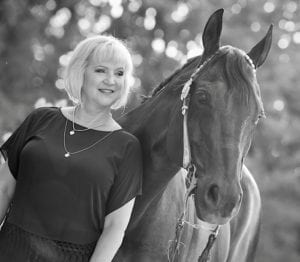 It is always wise to expect the unexpected, but this is especially true when it comes time to select an insurance plan for your lovable, but clumsy equine partner. Christine Hocutt-Senteney works in the office and the field as an Equine Insurance Agent and Producer for the EMO Agency and Equisport.
It is always wise to expect the unexpected, but this is especially true when it comes time to select an insurance plan for your lovable, but clumsy equine partner. Christine Hocutt-Senteney works in the office and the field as an Equine Insurance Agent and Producer for the EMO Agency and Equisport.
Senteney elaborated on different insurance positions, such as field agents who work directly with a company to curate clients or agents for an agency who might work with different companies depending on their client’s needs. Those positions typically are commission style jobs with contracts.
Senteney further advised, “You must be a good negotiator as you will be dealing with insurance company underwriters and adjusters on issues that will affect your client. A good agent will have the skills to assess what their client needs and be able to find them the right coverage. Also, analytical and organizational skills are important. An agent needs to understand that the job is not 9 to 5. With smartphones, communication from clients can come in at any hour of the day, any day of the week. You must be responsive to that.”
Christine added, “One of the most difficult things to deal with is when a client has a loss. Whether the horse dies or has a serious injury, you must be there for the client, and yes, it is sad. Having owned and loved and lost horses throughout my life, it’s still hard when I’m on the phone consoling a distraught client. A good agent always cares.”
***
Some of the primary qualifications of these five jobs include a great work ethic, ability to learn and utilize different technology, commitment to the job, as well as effective communication skills. So, don’t be discouraged if the list of equine related jobs seems limited at first. Once you search further or think outside the box, there are several jobs centered on the equine industry available to all different age groups and skill levels. The main component is the need for passionate, horse-crazy individuals to apply.


